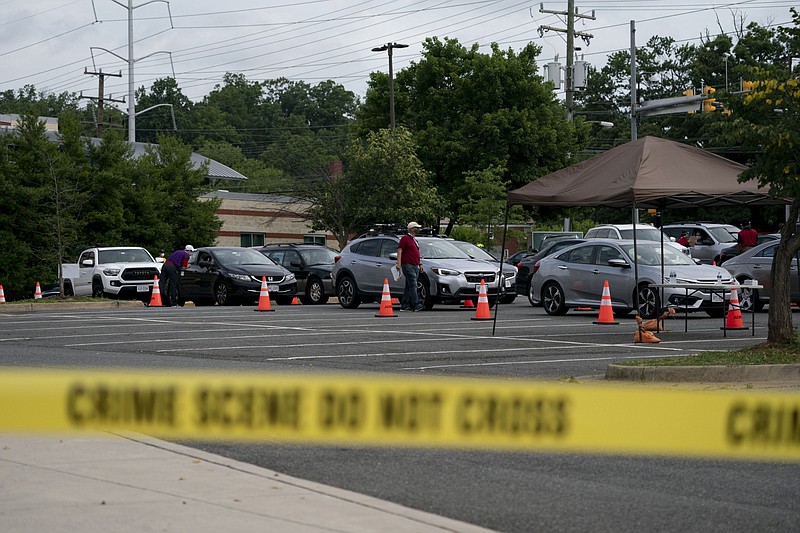The U.S. is again grappling with a shortfall of testing that has hobbled the nation since the pandemic's early weeks, and now threatens to further undermine containment efforts at a crucial moment.
In new hot spots like Arizona, Texas and Florida, where covid-19 is rapidly spreading, lines for testing extend outside of urgent-care offices and other sites. Two high-school football stadiums in Houston regularly hit capacity by midmorning and have to turn people away.
The country's largest labs are forecasting a surge in demand that could lead to longer waits for test results and have warned that limited amounts of critical testing supplies could become a constraint. Though capacity has expanded, widespread testing remains elusive, in part because of persistent supply shortages.
"We are still grossly inadequate. We're so far behind," said Howard Forman, director of the Yale School of Public Health's health-care management program. "We still have a supply issue, and then we had a demand issue. You have both issues playing out. At the federal, state and local level, you need both those things addressed."
The testing dearth comes months into a public-health crisis in which, absent a vaccine, covid-19 screenings have become the first line of defense. Reopening states only turned up the pressure, boosting demand for testing as Americans increasingly went back to work, ate out, got haircuts and gathered socially.
[CORONAVIRUS: Click here for our complete coverage » arkansasonline.com/coronavirus]
The surge in cases has forced states to reconsider their reopening efforts. New Jersey Gov. Phil Murphy on Monday paused plans to restart indoor dining Thursday. New York Mayor Bill de Blasio and New York Gov. Andrew Cuomo also said skyrocketing cases in the South and West have prompted them to consider postponing dining's return. U.S. virus deaths have exceeded 125,000 out of more than 2.5 million reported cases.
The pause in reopening was endorsed by Larry Kudlow, the top White House economic adviser. And Senate Majority Leader Mitch McConnell, R-Ky., on Monday joined Vice President Mike Pence in encouraging the public to wear masks.
On Tuesday, top federal health officials including infectious-disease expert Anthony Fauci appeared at a Senate committee hearing to discuss efforts to get back to work and school.
Worldwide, deaths have surpassed 500,000. The World Health Organization said "the worst is yet to come" as some countries see a resurgence of cases. Half of the deaths are coming from the Americas.
The irregular reopening in the U.S. reflects the two-steps forward, one-step back pace seen elsewhere. In the U.K. and Germany, authorities have reimposed strict lockdown measures on areas affected by local infection clusters.
The shortfalls in U.S. testing availability highlight the Trump administration's failure to execute a cohesive national strategy. The burden shifted to states, which were provided some testing supplies in May and but have been told only limited amounts are available thereafter.
The U.S. processed about 557,000 tests each day, on average, over the past week, according to the Covid Tracking Project. Given the size of the current U.S. outbreak, 2 million to 4 million tests a day would be needed "to do something to really wipe it out," Forman estimated. "We're not really close to that."
In Texas, which is quickly becoming the new U.S. epicenter, the strain from increasing testing demand was felt by hospitals, public-health departments and patients alike.
Houston Mayor Sylvester Turner said capacity at the Delmar and Butler stadium sites was expanded by 30% starting Tuesday.
A line that started before 5 a.m. Sunday at an urgent-care center in south Austin was compared to the wait for a wristband to Austin City Limits, the city's annual music festival, or the line for barbecue at Franklin's, which would draw dozens of customers to its doors before sunrise.
Kaitlin Heikes, a 26-year-old San Antonio resident, had to drive 45 minutes to Spring Branch for a rapid test. She made an appointment Sunday for Monday after she didn't have any luck on Friday or Saturday.
At the Houston Methodist hospital system, demand for testing doubled over the past week or so, David Bernard, medical director of clinical pathology, said in a Friday interview.
The lab has faced an uphill battle securing supplies, and equipment is needed after diagnostics companies initially prioritized early hot spots like New York.
"We've been stretched," Bernard said. Test manufacturers "don't give you as much as you want, and it's been a struggle. We've had to work as hard as we can to get things done."
Covid-19 cases are on the rise in Harris County, home to sprawling Houston, which for a time had been able to meet demand, said Umair Shah, executive director of Harris County Public Health.
